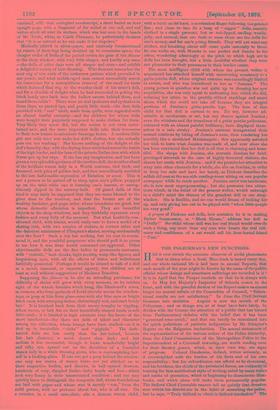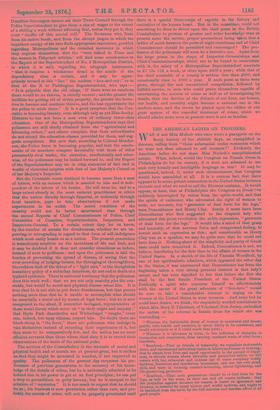THE POLICEMAN'S NEW FUNCTIONS.
HAS it ever struck the accurate observer of social phenomena that in times when a fresh Blue-book is issued every day, and our whole national life is laid bare in annual Reports, that each month of the year might be known by the name of the•public official whose doings and sometimes sufferings are recorded in it ? It is in April that the Pauper reminds us that he is always with us. In May her Majesty's Inspector of Schools comes to the front, and with the graceful diction of his Report makes us almost forget the annual refrain of the Committee of Council, " Educa- tional results are not satisfactory." In June the Civil Servant blossoms into statistics. August is now the month of the Policeman ; and as things are, or at least have been lately, he divides with the Grouse the attention of a public that has turned from Parliamentary debates with the belief that it has been "governed over-much," and that can hardly be stimulated into the quick pulsations of patriotic indignation by Mr. Schuyler's Report on the Bulgarian barbarities. The annual statements of the representatives of the various orders of the Police hierarchy, from the Chief Commissioner of the Metropolitan Police to the Superintendent of a Cornwall township, are worth reading even for their literary graces, which, in their own way, are signs
of progress. Colonel Henderson, indeed, writes seriously, as if overweighted with the burden of his facts and of his own responsibility ; but his subordinates can afford to be rhetorical, and his brethren, the chiefs of the provincial forces, are evidently in training for that antithetical style of writing, aided by many italics and marks of quotation, which is beginning to characterise Blue- books, and which alone will make them permanently popular. The Salford Chief Constable cannot tell us quietly that drunken men within his distriot are in the habit of assaulting the police, but he says, "Truly Salford en ribotte is Salford combative." The
Dumfries Scavengers cannot ask their Town Council through the Police Superintendent to give them a rise of wages to the extent of a shilling a week without affirming that, unless they get it, they must "shuffle off this mortal coil." The Scotsman who, fresh from his native heath, and from the abrupt jargon in which the impatient energy of his race finds appropriate expression, growled regarding Metropolitans and the rounded sentences in which they express themselves, that the "men talked in Times and the women in Telegraph articles," will find some countenance in the Report of the Superintendent of No. 2 Metropolitan District, in which it is said, regarding the telegraph instrument, "that it inspires a wholesome dread in the minds of the depredatory class is certain, and it may be appro- priately termed in this " line " the modern " hue-and-cry ;" or in that of the X or Paddington Superintendent, who says It is palpable that the old adage, If there were no receivers there would be no thieves,' is strictly correct ; and the greater the facilities for getting rid of stolen property, the greater the incen- tive to become and continue thieves, and the less opportunity for the police to catch them." It is a good symptom that the Con- -stable is becoming literary, even although only as yet Blue-booky. Hitherto he has not been a man even of ordinary lower-class education. One of the Metropolitan Superintendents says that policemen are still chiefly obtained from the " agricultural and labouring orders ;" and others complain that their subordinates do not attend the education-classes provided for them, and sug- gests compulsion. But now that, according to Colonel Hender- son, the Police force is becoming popular, and that the emolu- ments of its members compare favourably with those of other presumably rival trades, the elevation, intellectually and other- wise, of the policeman may be looked forward to, and the Report of the Superintendent may vie in crisp statement of fact and in wealth of rhetorical surprise with that of her Majesty's Consul or -of her Majesty's Inspector.
But the Constable seems destined to become more than a man of letters, with an income which is assured to him and is inde- pendent of the labour of his brains. He will soon be, and to a large extent already is, the most eminent practitioner in ethics that the nation directly through Imperial, or indirectly through local taxation, pays to take observations if not make experiments in its midst. The moral condition of the -country could not be better ascertained than through the annual Reports of Chief Commissioners of Police, Chief Constables of Counties, Superintendents, Inspectors, and Inspectors-General. To a certain extent they let us know, by the number of arrests for drunkenness, whether we are im- proving or retrograding in regard to that form of self-indulgence which most easily besets us as a nation. The present generation is tremulously sensitive on the sacredness of life and limb, and it may be doubted if it does not consider cleanliness as before, instead of next to godliness ; and upon the policeman is laid the burden of preventing the spread of disease, of seeing that the -over-crowding of lodging-houses, the thronging of thoroughfares, the reckless dash of the driver of a " light cart," or the thoughtless insanitary policy of a suburban laundress, do not end in death or a typhoid epidemic. There is universal testimony that the policeman does this work well ; that we are not only anarchy plus the con- stable, but would be moral and physical disease minus him. It is true that he is not able to put down drunkenness, but that proves nothing more than that he is unable to accomplish what should be essentially a moral end by means of legal force ; but he is now %recognised as the silent, if somewhat inelegant, representative of those social forces which move on "in their might and majesty ;" that Hyde Park disorderlies and Whitechapel " roughs," every -one, indeed, but tipsy citizens, respect him. No doubt there are black-sheep in " the force," there are policemen who indulge in vice themselves instead of recording their experiences of it, but they seem to be comparatively few, and the nation has no more efficient servants than those whose chief duty it is to record their -observations of the beats of the national pulse.
The services of the Constabulary in the interests of moral and :physical health and of morals are at present great, but it strikes as that they might be increased in number, if not improved in quality. The policeman of the present day surpasses his pre- decessor of previous generations in the accuracy of his know- ledge of the details of crime, but he is universally admitted to be behind him in his power to get at its first principles ; he can put a stop to peccadilloes or petty larceny, but he is unequal to the solution of " mysteries." It is too much to expect that he should be so.; his business is now prevention rather than cure, and pro- bably the secrets of crime will not be preperly penetrated until there is a special State-corps of experts in the history and curiosities of the human heart. But in the meantime, could not something be done to throw open the chief posts in the British Constabulary to persons of greater and wider knowledge than at present enter the service, proper precautions being taken that a ladder of merit between the posts of night-watchman and of Chief Commissioner should be permitted and encouraged ? The pro- fession of the policeman will soon be a lucrative one. Apart from the large prizes, in the shape of Inspector-Generalships and Chief-Commissionerships, which are to be found in connection with it, the salary of a Metropolitan Superintendent amounts to £7 13s. lld a week, or close upon £400 a year ; while that of the chief constable of a county is seldom less than £500, and occasionally rises to £800 a year. If such posts as these were given, through fair and unrestricted competition, followed by faithful service, to men who could prove themselves capable of ascertaining the sources of crime as well as of investigating its details, then the Service of the defence of our lives, our homes, our health, and morality might become a national one in the modern sense, and the crown be placed upon the edifice of our great system of the remedial treatment of crime, which we should admire more even at present were it not so familiar.































 Previous page
Previous page